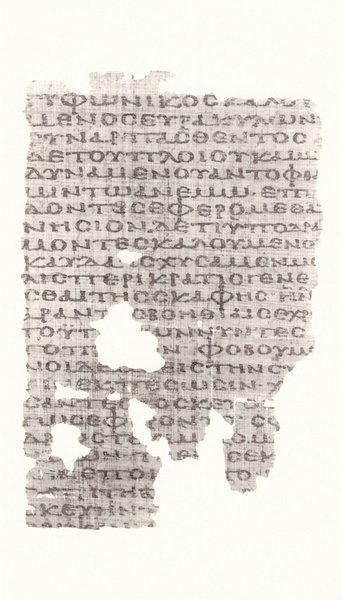Homily of Fr. Paul Panaretos, S.J. during 40-day Institute, Guelph, Ontario
Both Meanings
The Letters of John were addressed to a church called the elect lady.1 The Second and Third Letters of John are so brief that alone they easily could have been lost. They survived because they were sent together with the lengthier, more substantial First Letter. One was a cover letter for it; the other recommended the bearer of the packet to the leader of the church of the elect lady. Conflict lacerated the community. The letters let us appreciate what it believed. Some had gone out2 of it because of the belief that acknowledge[d] Jesus Christ as coming in the flesh. The letters give us no information about what those who went out believed.
Not knowing what those who went out believed: rather than being a loss not knowing is a gain, a liberty. My conviction may be a heresy to my North American culture—it idolizes knowledge. It may be so for yours. I see it as a liberty in the light of our prayerful reflection today: discernment of spirits under the guidance of St. Ignatius of Loyola and a phrase at the close of the selection from Second John: teaching of Christ.
My eyes were opened to notice the phrase includes more than a first-take suggested. It includes teaching about Christ and from Christ. The first is the true understanding of Christ that allows one to have both the Father and the Son. From Christ suggests the principal commandment from him in which they were walking: to love one another.3 The Spiritual Exercises involve both meanings.
An experience of the Exercises deepens understanding: felt-knowledge, in the phrase of Ignatius. The experience allows one to receive the coming of Jesus in the flesh: that is, one embodies by grace the Incarnate risen Jesus and walks in his love. The same experience is a graced receiving of divine fullness—both the Father and the Son in the Spirit—in each one’s limited way.
 Ignatian discernment allows us to recognize and accept our limitations—one reason we are susceptible to desolation; and to look forward in hope to be truly enlightened and recreated by the divine fullness. Ignatius named the divine fullness fondly and reverently: Creator and Redeemer.
Ignatian discernment allows us to recognize and accept our limitations—one reason we are susceptible to desolation; and to look forward in hope to be truly enlightened and recreated by the divine fullness. Ignatius named the divine fullness fondly and reverently: Creator and Redeemer.
The enemy of human nature desires we walk life lonely, seeking our interests first as if that search could satisfy. The enemy uses our vulnerabilities and strengths against us, even deceiving us under the guise of good. Walking in love; behaving lovingly; feeling with love: turn us from the enemy and toward our Creator and Redeemer, risen Jesus.
Our constant turning toward love, hastening to it and embracing it is our constant conversion—Jesus’ appeal in the gospel. Living love protects us so neither pleasures nor relationships nor possessions limit us from being those whom our triune God creates every moment. Living love frees us to follow Jesus each of us has met these days.
__________________
- 2John 1.1.
- In addition to verse 7, also see 1John 2.19; 4.1.
- In addition to verse 5, also see 1John 3.11, 23; 4.7, 11.
_________________
Wiki-images: Papyrus of 2John PD-US; Statue of Ignatius of Loyola PD-Release

No comments:
Post a Comment